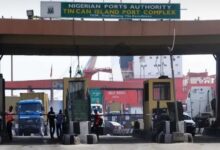Cargo Tracking Bill bad for business – Shipping Association
“Another toll gate for the government.”
![]() The Chairman of Shipping Lines Association of Nigeria, Ms Boma Alabi, has criticised the Cargo Tracking Bill, describing it as “another toll gate for the government.”
The Chairman of Shipping Lines Association of Nigeria, Ms Boma Alabi, has criticised the Cargo Tracking Bill, describing it as “another toll gate for the government.”
Boma expressed the association’s concern for the bill at a public hearing organised by the House of Representative Committees on Shipping Services, Customs, Port and Harbour and Maritime Safety, Education and Administrations.
Boma who spoke on the circumstances surrounding the non implementation of the international cargo tracking, said that it would not enhance the ease of doing business and trading in Nigeria.
According to her, the shipping industry in Nigeria is already over burdened with red tape and certainly does not require another layer of bureaucracy which is what the proposed cargo tracking bill would result in.
“All exporters and importers are able to track their goods on the website of the shipping lines generally speaking.
“In addition, the shipping lines have to upload their manifest to the Customs Services portal which is connected to the Central Bank of Nigeria (CBN) single window.
“They also have to upload this information to the Nigerian Port Authority (NPA) , the Nigerian Maritime Administration and Safety Agency (NIMASA), the National Drug Law Enforcement Agency (NDLEA), and the Department of State Security (DSS).
“Adding the cargo bill without streamlining the existing process will only result in further delays and congestion,” she said.
Earlier, the Executive Secretary of the Shippers Council of Nigeria, Mr Pius Akutah, told the committee that the country lost $2.5 billion dollars in five years over the non implementation of the International Cargo Tracking Notes(ICTN).
“If we implement it, that is what we should be able to put in the economy, within a period of two years.
“This is just part of what Nigeria is losing,” he said.
On his part, the Chairman of the committee on shipping services and related matters, Rep. Abdussamad Dasuk,said that the ICTN is far more than an administrative requirement.
He said that the ICTN remains an essential tool designed to bring transparency, security, and operational efficiency to the movement of cargo across borders.
He, however, ruled that further legislative consultations and actions would be taken on the bill.












